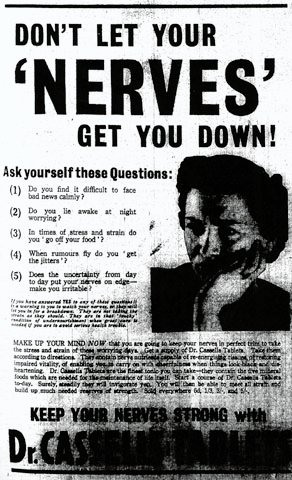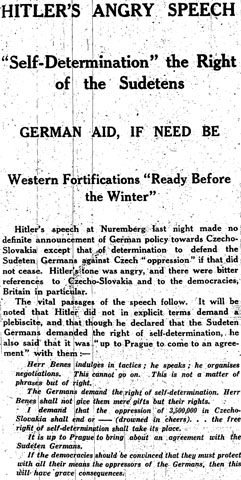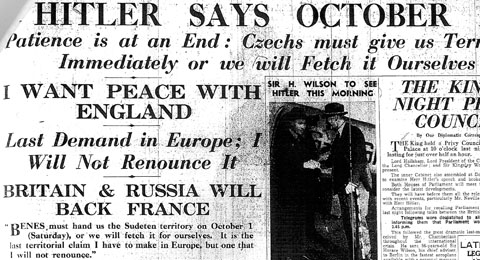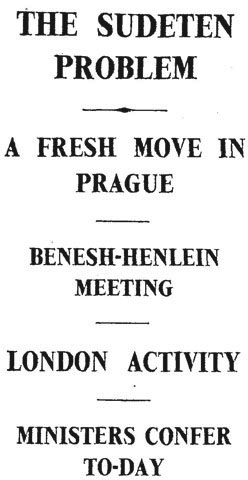
This time it’s the Manchester Guardian which has the scoop (p. 11): in late night meetings last night, the Czechs decided to accept the ‘recommendations’ of the French and British governments, albeit ‘possibly with reservations’. There’s still no official confirmation of what those recommendations are, but the London correspondent has some information from ‘responsible quarters in London’, which generally confirm the speculations of yesterday :
1. Areas in Czecho-Slovakia with a predominant German population to be ceded without a plebiscite.
2. Other areas to remain in the Czecho-Slovakian State under the federal system proposed in Dr. Benes’s Fourth Plan.
3. An international commission to “rectify” the new boundaries.
4. The independence of Czecho-Slovakia within these boundaries to be guaranteed by Great Britain, France, Germany, Italy, Poland, Hungary, Rumania, and Yugo-Slavia.
5. The neutralisation of Czecho-Slovakia and cancellation of her treaties of alliance.
6. The interchange of populations to be arranged by which German sympathisers within Czecho-Slovakia can go to the new German provinces and the population in these provinces that does not wish to remain there can go within the new boundaries of Czecho-Slovakia.
There doesn’t seem to have been any reaction from the German side, yet. It appears that Chamberlain’s planned second visit to Germany is going ahead, though the date is not yet set. But Henlein’s ‘Free Corps’ of Sudeten Germans is going to continue raiding Czech border posts from German territory (last night they attacked a customs post near Grumbach). The international news section (p. 15) reports that Poland and Hungary are lining up to press their own claims on Czechoslovakian territory. The American press is disgusted by the British and French plan: the New York Post says that it seems ‘like the world’s greatest betrayal’ and says that if this is collective security then the United States is lucky to be well out of it: ‘Thank God for the Atlantic Ocean!’
Rather happier with the government’s diplomatic moves are the Fascists: two fascist speakers in Finsbury Square claimed (p. 10) that ‘the Premier is now following the policy of Sir Oswald Mosley‘. Welsh Congregationalists (p. 6) are also pleased — to be precise, the South Caernarvonshire Welsh Congregationalist Association, which unanimously passed a resolution commending Chamberlain for his efforts to resolve the crisis by way of ‘consultation and co-operation’.
[U]nless peace be secured on these lines we shall not take part in war in any shape or form. We hold war to be a sin before God.
Businessmen ought to be happy too. The chairman of the Empire Exhibition, Sir Cecil M. Weir, spoke at the Glasgow Chamber of Commerce last night, where he said that the ‘commercial community […] are sick to death of the recurring crises in foreign affairs which have done so much to destroy confidence, create periodic serious unemployment, and heighten taxation’. He called for ‘a large-scale settlement on honourable and realistic lines of the many problems’ which cause problems in international relations.
The home front is being prepared for war, though there is much confusion. The Manchester Guardian has a report on the question of school children (p. 12). If there is an air raid, should they be sent home, or should they stay in school? The Board of Education’s official stance is that the schools should close ‘during the whole period for which air raids may be expected’. This is very vague, and different school districts are interpreting it differently: Oldham is going to close its schools on the outbreak of war, for at least a week, but Salford intends to close them only when an air raid occurs. That’s going to mean large numbers of children flooding onto the streets at once, and not all of them are going to be able to get home within the 7 to 10 minutes which might be the maximum warning time.
Somewhat more reassuring, at least for the sense that the government knows what it is doing, is the confident statement in the Daily Mail (p. 13) that if war comes, 1500 ‘local food officers throughout Britain will ‘know exactly what to do if the emergency arose. Action could be taken within 24 hours’. That is to say, rationing will be imposed, and quickly. This is according to Sir Henry French, director of the Food Defence Department of the Board of Trade. A couple of interesting points: since the transport of food is much more efficient than in the last war, shops and warehouses are carrying less stock now, meaning that there’s less margin for safety in the system. Efficiency is not always a benefit, then. And a leading article on the same subject (p. 10) looks forward to rationing because it will lead to improved nutrition, since `some 12,000,000 to 22,000,000 people, even when there is no lack of money, do not know how to extract the biggest measure of health from their diet in peace time’. So enforcing a sensible diet through rationing will help here. (Which, as I understand it, was indeed one benefit of wartime rationing.) But this implies a long war, or else there’d be no time for better nutrition to lead to better health!
I’ll close with what I think is another example of crisis-related advertising, from the Daily Mail (p. 7):

It’s certainly a period of bad news, rumours, uncertainty, stress and strain. And maybe Dr. Cassells Tablets were just the thing!
![]() This work is licensed under a Creative Commons Attribution-NonCommercial-NoDerivatives 4.0 International License.
Permissions beyond the scope of this license may be available at http://airminded.org/copyright/.
This work is licensed under a Creative Commons Attribution-NonCommercial-NoDerivatives 4.0 International License.
Permissions beyond the scope of this license may be available at http://airminded.org/copyright/.






Sorry Brett,
Hate to correct you here. A “scoop” on page 11?
Scoops are on page 1. Page 11 might just be late-breaking news, ’30’s style.
Yes, actually.
One of the interesting things about exploring media from before the big event is finding ideas that were supposed to be emergent during it are actually present before hand. I’m thinking of the momentary loss of power in “bunting” flight in carburetted engines that is often mentioned in Battle of Britain histories as though it were a new discovery. But, hey, rationing has some minor historical significance, too.
The reason that I think they’re interesting is that you begin to suspect that the fuss made is informed less by observed effects than by anticipation.
Yep! Though for us it works the other way around too, reading backwards from ‘the big event’ to find precursors. I think I’ve done that here — upon reflection, the food defence plan probably isn’t just rationing but also simple storage of food, in case the distribution network breaks down (e.g. through a knock-out blow).